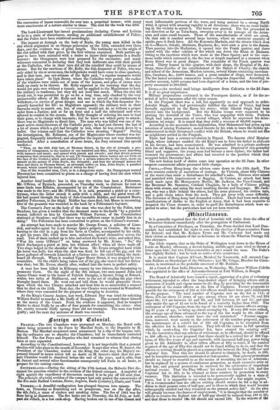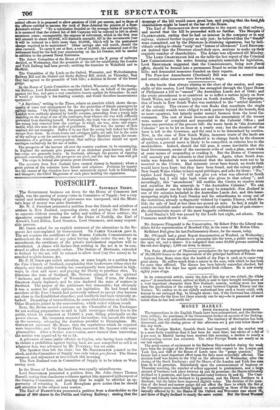fillisttllarteous.
It is generally reported that the Earl of Lonsdale will retire from the office of Postmaster-General immediately after the prorogation of Parliament.
In a Committee of Privileges, on Thursday, the Peers decided that Lord Dan- sandals had established his right to vote in the election of Representative Peers for Ireland; and that Mr. Kemyss Tynte and Mr. Cochrane had made out their claims as descendants of the co-heiresses in whom the Wharton Peerage fell into abeyance.
The Globe reports, that as the Duke of Wellington went down to the House of Lords on Monday afternoon, a decent-looking middle-aged man tried to thrust a letter upon him; but two Police-constables at once seized the man. The Duke's face slightly flushed ; but he took no notice of the occurrence.
It is stated that Captain A'Court, Member; for Tamworth, will succeed Cap- tain Bolder° as Storekeeper of the Ordnance; and Mr. Cripps, Member for Ciren- cester, is mentioned as the probable successor of Mr. Bonham.
At a Court of East India Directors, on Wednesday, Mr. James William Cols* was appointed to the office of Advocate-General at Fort William, in Bengal.
The Board of Admiralty have issued a report, approving of a plan of voluntary retirement, intended to effect the long-desired object of bringing officers still in possession of health and vigour nearer to the flag, by providing for the honourable retirement of the senior officers on the lists of Captains. Former proposals to provide for the retirement of 100 or 150 officers would have been quite inadequate for the purpose. "The total number of Captains now on the list is 714; of these, 376 are above 55 years of age; among whom 50 are above 70, and 205 above 60; 171 are between 55 and 60, and 138 between 50 and 55; and nine only under the age of 45 are to be found of a seniority higher than 1827. The retirement of 100 Captains from the top of the list would remove officers averag bug 67 years of age, to bring up others averaging 64. If even 200 were the average age of those advanced to the top of the list would be 60; either of such schemes, therefore, would leave the evil untouched." "Former sugges- tions, moreover, went merely to the retirement of the number proposed, and to the maintenance of a retired list of 100 old Captains, to be recruited from the effective list in death vacancies. They left all the causes in full operation which, by overleading the Captains' list, have created the existing evil." "In the convietiou that any scheme of retirement, to be effectual, should be offered to 300 officers, it is now proposed that there should be a retired list of 300 Cap- tains, of fifty-five years of age and upwards, with increased half-pay, power being given to the Admiralty to allow infirm officers of fifty to retire, if the number required of the age of fifty-five should not be found willing to do so, and that the officers so retiring should be placed on a separate list between the Flag Officers' and Captains' lists. That this listshould be allowed to diminish, by death, to 100, and be hereafter permanently maintained at that number. That general promotions should no longer be resorted to as the means of recruiting the list of Admirals; but be replaced by a system of continuous promotion, as death vacancies arise on that list; and general promotions be reserved for the celebration of important national events. That the Flag Officers' list should be limited to 150, and the Captains' list to 400, to be retained at those numbers by promotion to every vacancy. This limitation is intended to be permanently applied to a state of peace, but it is impossible to say what the exigencies of .a war might require." It is recommended that the officers retiring should receive 5s. 6d. a day in ad- dition to their present rates of half-pay, and to those to which they would become subsequently. entitled had they remained on the present active list." As the plan will greatly increase the chances of employment, "it is thought that the number of officers to receive the highest rate of haff-pay should be reduced from 100 to 50; and that those to receive lb. 6d should not exceed 100. To the widows of the retired officers it is proposed to allow pensions of 1101 per annum, and to those of the officers entitled to assume the rank of Rear-Admiral the pension of a Rear- Admiral's widow." "By a calculation founded on the average tables of mortality, it is assumed that the retired list of 300 Captains will be reduced to 100 in about seventeen years: consequently, the expense of retirement, which in the first year will amount to about 30,0001, will diminish annually, till in the seventeenth year it will be reduced to a little more than 10,0001, which will be the permanent charge required to be maintained." Other savings also will result, should the plan succeed. To carry it out at first, a vote of 15,0001, the estimated cost of the retirement fund for the half year commencing on the 1st October, will be needed in addition to the present Naval Estimates.
The Select Committee of the House of Commons on the X group of railways decided, on Wednesday, that the preamble of the bill for establishing the London and York Railway had been proved; omitting the branches to Wakefield and to Sheffield.
The Committee of the Lords on the Oxford, Worcester, and Wolverhampton Itailway Bill and the Oxford and Derby Railway Bill, stated, on Thursday, that they had agreed to the preamble of both bills; a decision in favour of the broad gauge. In the House of Lords Committee on the Oxford, Worcester, and Wolverhamp- ton Railway, Lord Redesdale was examined, last week, on behalf of the parties against the line and gave a very conclusive reason against its formation: be said it would go through a fox-hunting country, and would therefore inconvenience sportsmen !
"A Barrister," writing to the Times, relates an anecdote which shows the ne- cessity of sense new arrangement for the due protection of female passengers by railway trains. "On Friday last, the passengers in the train from Liverpool to London were suddenly alarmed by terrific screams, proceeding from a young lady standing on the steps of one of the carriages, from whence she was with difficulty prevented from throwing herself. Fortunately, the train was at once stopped, and the young lady removed from the carriage in which she was, alone and unpro- tected, with two men in the garb of gentlemen. What was the nature of their conduct did not transpire. Suffice it to say that the young lady risked her life to escape from them. In steam-boats and carriages ladies are safe, but in the noise of the railway a cry for assistance is unheard." The Barrister urges the recom- mendation of a previous correspondent, that railway directors should set apart carriages exclusively for the use of 'miles.
The prospects of the harvest all over the country continue to be encouraging. In England the accounts give promise of an abundant grain-harvest, and the hay-crops are generally heavy. In Scotland, although the process of ripening proceeds somewhat tardily, the prospects are good, and the hay has been well got in. The crops in Ireland also promise great abundance.
The accounts from New Zealand have created dismay in Scotland; where a great portion of the colonists have friends and relations. Petitions for inquiry nto the causes of the disorders have been extensively signed both in Edinburg and Glasgow; the Chief Magistrate of each place heading the signatures.



























 Previous page
Previous page